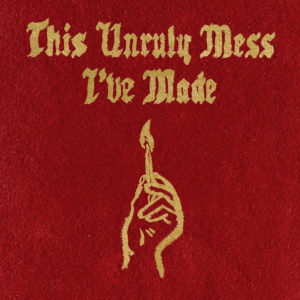Macklemore & Ryan Lewis – This Unruly Mess I’ve Made (2016)
Macklemore proves he is no fluke with his and Ryan Lewis’ follow-up to their surprise independent hit The Heist. In many ways, This Unruly Mess I’ve Made is an even better album. There is some filler (“Dance Off”), like the last album, but there are more good songs here. In fact, this album is pretty solid from top to bottom.
What makes Macklemore stand out more than anything is that in an era of “third way” politics, where those supposedly on the left have capitulated to the political right, leaving a vacuum of genuinely left perspectives (in other words, the third way faces off with the first way, glossing over the absence of engagement with the second way), he goes in another direction. He is rather blunt and explicit, but in that he is just a countervailing force to the rise of unconcealed bigotry.
“Growing Up” is an ode to Macklemore’s daughter, reminiscent of The Coup‘s “Change Your Draws.” “Kevin” takes on the corruption of the pharmaceutical industry and the complicity with the medical industry that over-prescribes medication. “Let’s Eat” is about body-shaming and is a humorous exploration of the complex relationship with food people have in late capitalism (the Scott Joplin-like piano riff is pitch perfect). “White Privilege II” ranges from snippets explaining how mothers let their kids listen to Macklemore because he’s “positive” to #blacklivesmatter activism. All of these are issues marginalized — if not outright facilitated and exacerbated — by mainstream media.
The opener “Light Tunnels” is great. It is a bunt commentary on Macklemore attending a major music award ceremony. It is both blunt and critical because he spends much of the song probing the intersection of art and commerce, and making explicit the economics and exploitation built into the system. As with his debut album, some listeners can’t stand this approach. Their criticisms tend to be that he is impertinent. But really, those critics tend to be the desperate lumpenproletariat who see no way forward and harbor delusions that hierarchies of power and oppression will somehow benefit them. Macklemore is explicitly wondering about a system that is better (more egalitarian) and not based on exploitation — not that he outlines such a system (now that would be a boring song!) but he traces the contours of the present system to show how far removed it is from what he considers a better system.
In short, Macklemore continues trying to shift the locus of debate in hip-hop music. He continues to question the way the genre and the music industry as a whole seems built on bias and discrimination (against women, the overweight, etc.), and dwells on empires of superficial attention-grabbing. Liberals absolutely hate this, because they advocate a form of universal domination by capital and Macklemore is questioning the tactics of capital in ways that could be significant. But, fuck ’em, seriously. Macklemore & Ryan Lewis are not standing wholly apart from the music industry and it’s demands. They get their hands dirty in it. But they also advocate for an independent point of view that is not about just accumulating money and fame in a crass materialistic way. If it also needs mentioning, there should now be no doubt about Macklemore’s rapping abilities. He’s spot on here, with impeccable rhythm for his style of essay rapping. Ryan Lewis also deserves special attention. He may not be pushing any boundaries, but his melodic backing tracks, which lean heavily on piano and backing vocal harmonies with a sensibility heavily informed by the old boom-bap style, complement and enhance the raps deftly. This album may have been a commercial flop, compared to the duo’s last album, but it is definitely an artistic triumph.

